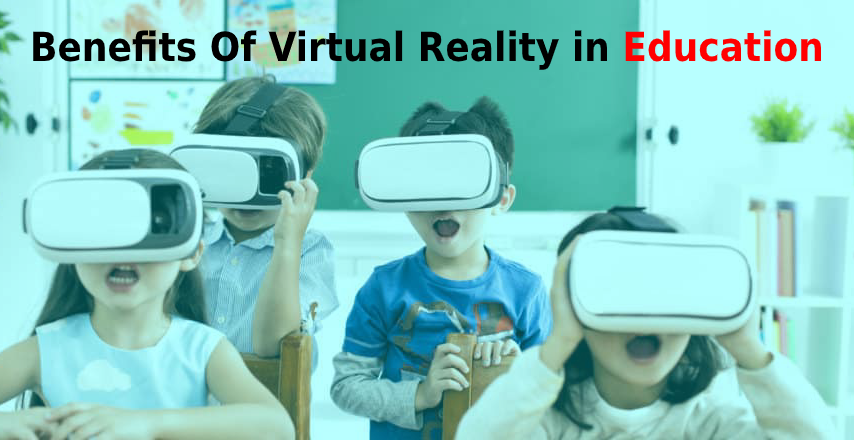The advent of the latest technologies has created a deep impact on our modern-day education system. Using the modern-day techniques imparting of education is not confined within the four walls of the classrooms. Immersive technologies like Virtual Reality made learning highly interactive by making the content visually impressive with impeccable designs and graphical animations.
In this post, we will mainly talk about the benefits of VR in today’ s education industry.
Some industry-based statistics which indicate the popularity of VR for education
Reports from the market research industry suggest that 97 percent of the students would prefer to go for VR based courses.
With respect to VR investments, education is regarded as the fourth biggest sector.
By 2020 the education industry for VR is expected to reach around 200 million USD while in 2025 it is assumed to be worthy of 700 million USD.
93 percent of the teachers are of the opinion that their students would love to get taught by using VR.
Out of 10 teachers, 7 would prefer to use VR simulative experiences relevant to the materials that are to be taught in the class.
So now you can understand the potentialities that VR holds for education. VR app development for education is necessary as both teachers and students can communicate interactively and can assess the performance of the students without doing much of paper works.
Let Us Check Out The Distinctive Benefits That Can Be Brought To The Current Education System With VR.
Improved Classroom Experience: The education process is constantly getting modified in the current global scenario. New ways of teaching are coming up which need to be incorporated so that learning experience can be made inquisitive for the students. VR is regarded as one of the progressive technologies which can bring in the desired changes in our education system so that the students do not feel bored listening to the same types of lectures or following age-old textbooks.
Advantages Of VR Classroom:
- Focused attention
- Interactive environment
- Audio-visual communication
- Flexibility in time and location
Ease Of Access: With VR each and every student can have an equal share of education. By the virtue of VR, education has expanded beyond books and computers. Just by wearing VR devices you can experience museums or pyramids for History, conduct experiments with chemicals or perform human body dissection for Chemistry and Biology with ease and efficiency. This is because there is no real harm or injuries involved and you can continue your studies until you are proficient in it.
There are ample reasons for distance to disabilities, due to which students face enormous limitations in availing of their education. Using VR you eliminate those differences with respect to all subjects and all types of learning. Even students suffering from disabilities can take the help of this technology to learn their subjects. Teachers constantly try out new ways to make teaching effective so that students can perform better and can pay more attention to their studies. VR has replaced studies through video chatting or doing researches by sitting in front of the computer. Autistic students also do not get deprived of availing their education outside the confinement of classrooms by using VR technology.
Advantages:
- Easy understanding of the concepts
- Learning from mistakes
- Convenience in learning at own pace
- Smooth evaluation
Gamification: Gamification is a process through which the learners are involved as they can gain knowledge through experimentation, making mistakes and then doing things in the correct way as desired. Using Virtual Reality, gamification can bring in an instant and live moments for the students. Educational institutions can take the help of the VR app development companies if they wish to introduce gamification in their process.
Gamification can instill competitive spirit among students so that they become more eager to learn something new. In fact, it can make education all the more attractive by logically incorporating the concept of any particular lesson. For example, with gamification in VR, the students can know about the Stone Age era in an interactive way by playing various games with respect to the making of stone tools or carving the stones and then study about the lives of ancient people who lived during that period.
Advantages:
- Interactive learning
- Better engagement
- High retention
- Simplified teaching
Reduces Complexities: VR in education is all about creating innovative solutions to make learning enjoyable for students of all ages. Subjects like medicine and engineering are considered a bit complex as both of them rely heavily on experiments or observations. It is also a known fact that great results can be achieved by 80 percent hard work and 20 percent talent. A theory, in reality, has no value unless it is put into practice. VR students can actually experiment with things that they do not have access to in schools.
Simulating dangerous and impossible scenarios is possible with VR so that the students can actually experience the pros and cons without suffering any losses or damages. For example, students aspiring to become medical professionals can conduct human body dissections with VR to know the details of the internal organs or about the procedures to make successful operations. In this process, they can learn through their mistakes and can perform the experiments as many times as possible until everything gets perfect. The same thing is applicable to the discipline of engineering.
Advantages:
- Ease of complex concepts
- Learning through experimentation
- Easy understanding of minute details
- Unlimited Practice
Instant Engagement: Using VR students can be engaged immediately with zero distractions. In VR the educational environment becomes so vivid that the students get 100 percent involved. Thus the teachers can inculcate quick thinking, instant reflexes and apt attention among their students so that they can be more attentive to their studies. For instance, if you tell your students to open the page of their books and start reading they may not feel interested in the very first attempt. But with VR this is not the case. Using this technology they can interact with each and every component of their educational process like clicking on the button, downloading presentations etc.
Advantages:
- Immersive learning
- Impressive visualization
- Better attention
- Innovative interaction
VR in education has gained more prominence owing to its unique presentation of facts and figures along with situational explanation. Each and every business is looking forward to adopting this technique so that their business process can be made smooth and also the customers can be attracted and engaged for good. Education as a business is no exception in this regard. Various schools and colleges have already been successful by incorporating VR to teach the students. Many of them are yet to follow this practice. VR for education has ample benefits some of which have been already stated above in this post.
Conclusion: VR as an interactive technology has made learning both fun and engaging for the students of today. It not only enables in making learning interactive and immersive but also facilitates students to become familiarised with innovative and modern technologies. Not only school students but professional students like aspiring doctors and engineers can also be equally benefitted using VR. They can actually conduct experiments with ease and efficiency to learn the nuances by trial and error methods. This is because in VR there is no chance of causing real-time harm or losses to equipment or human lives.
Author Bio:
Mr Arup Roy is the founder of Red Apple Technologies, a renowned VR app development company. Being a tech-lover he wants to know more about the trending techniques that can benefit businesses across industries in today’s competitive world. This apart, he also writes and reads blogs and articles on the latest technologies which can impact the global business environment.








